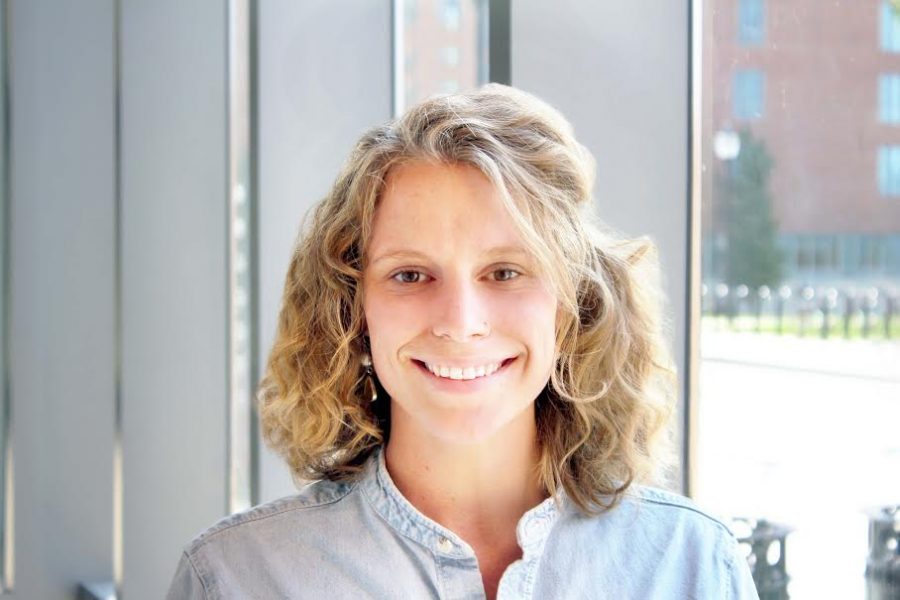The grass is always greener for Ainsley Brosnan-Smith
AMHERST — Like grass that grows in the cracks of concrete sidewalks, Ainsley Brosnan-Smith resiliently promotes sustainability at the University of Massachusetts Amherst as the Student Government Association’s secretary of sustainability.
Inspired by the plastic bottles that litter the ground and trash bins filled with single-use items, Brosnan-Smith has spent her entire UMass career trying to push sustainable initiatives. But even the title of secretary of sustainability doesn’t make her immune to the pushback that comes with trying to advocate for those who have no voice.
The Shrewsbury, Massachusetts, native can’t recall any ‘aha’ moment that inspired her love for the world around her. Instead, she remembers always having sympathy for living things that humans use to help themselves.
“My whole life growing up I felt bad for the bees, the birds and the fish that didn’t really have a voice, and like people were just walking all over them,” said Brosnan-Smith. “I was always just very caring for the resources that helped us grow, because we weren’t really helping them grow.”
She began her college career as a marine biology student at the University of Tampa in Florida, but transferred to UMass after her second semester. This was in part because of UT’s lack of focus on environmental sustainability, she said. Now, she is a senior environmental conservation major pursuing an accelerated master’s degree in public policy with a concentration in environmental policy.
Brosnan-Smith was originally a volunteer for the Green Office Program, and rode her bicycle to offices on campus to pick up their compost. She then became a waste and recycling fellow for Sustainable UMass. The Sustainability Fellowship Program is a two-credit program where students work with faculty to plan sustainability projects around campus.
During her time as a fellow, she became the project coordinator for New2U, a student-run program that collects unwanted items at the end of the semester and sells them at the beginning of the following semester. She also wrote a proposal that switched the paper supply on campus from 100 percent tree paper to 40 percent recycled content paper.
While Brosnan-Smith has always been connected to environmental issues on campus, she had no prior experience in student government before she was sworn into the UMass SGA in fall 2016.
She started the Compost Pilot Program that launched last year, and has most recently pushed a motion through the SGA senate to phase out the use of UMass branded disposable water bottles from campus events.
According to Brosnan-Smith, her title brings both perks and speed bumps. When faculty see her SGA title, it prompts a quicker response than if she used her regular UMass email.
The title also includes the SGA bureaucracy that slows Brosnan-Smith down.
During her time at Sustainable UMass, she used to be able to write and send letters to campus officials without a second thought. Now, that same process includes garnering support from the SGA senate and student body.
“Being a secretary is more of just informing your constituents and making them aware of the problems as well, and what you’re trying to tackle, and making sure they are on board with you tackling these problems,” said Brosnan-Smith. “So it does come with a lot of bureaucratic speed bumps.”
Brosnan-Smith is immersed in her work, and said she is heartbroken when others don’t care as much about the policies and environmental initiatives she brings up. While she is no stranger to successfully presenting policies to her peers, some of her ideas haven’t has as much success. One example is her idea of creating a “green fee”
Last year, in her first year as president, Brosnan-Smith made a motion to establish the “green fee”, a waivable fee that would be applied to every student’s tuition bill. Hypothetically, the money would go towards the Sustainability Innovation and Engagement Fund, a fund used to support sustainability initiatives on campus.
“I care so much about the well-being of all things on earth that when I try to express a motion that would help the prosperity of these things and people vote it down, it hurts me, because I’m like, ‘but this is to better the environment,’” said Brosnan-Smith.
To escape these moments of frustration and stress, Brosnan-Smith takes breaks from her work to go on retreats into the woods — the environment that she works so hard to protect.
“Nature is resilient and we can’t control nature,” she said. “We can cut it down and things but once all the humans die out nature will still exist.”
Email Brian at [email protected].

"The hero of my tale–whom I love with all the power of my soul, whom I have tried to portray in all its beauty, who has been, is, and always will be...










